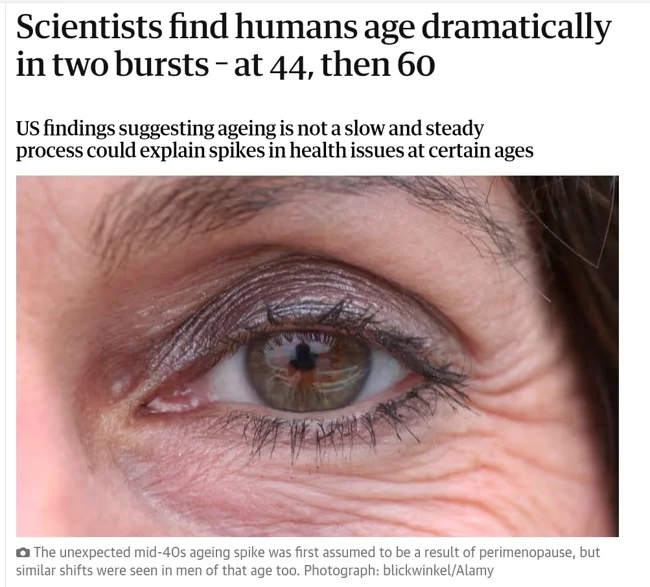Scientists have discovered that people age sharply in two stages: at 44 and at 60 (6 photos)
A study that tracked thousands of different molecules in people aged 25 to 75 found two major waves of age-related changes - from 40 to 49 and around 60. 
If you've noticed a sudden onset of wrinkles, aches and pains, or a general feeling that you've aged virtually overnight, there may be a scientific explanation.
Aging isn't a slow and steady process, a study has found. This explains why health problems spike at certain ages: around 44 and 60, the Guardian reports. 
The findings may explain why some health problems, including musculoskeletal and cardiovascular diseases, spike at certain ages.
We're not just changing gradually over time. These are really dramatic changes
," says Michael Snyder, a geneticist and director of Stanford's Center for Genomics and Personalized Medicine and senior author of the study.
It turned out that the time for radical changes in the body comes after 40 years, and also after 60 
The study involved 108 volunteers who gave blood and stool samples, as well as smears from the skin, mouth and nose every few months for a year, and some for seven years. Scientists analyzed 135,000 different molecules (RNA, proteins and metabolites) and microbes (bacteria, viruses and fungi living in the intestines and on the skin of the participants).
It turned out that the abundance of most molecules and microbes did not change gradually, chronologically. When the scientists looked for clusters of molecules with the biggest shifts, they found that these changes tended to occur when people were in their 40s and 60s.
The aging spike from around age 40 to age 49 was unexpected and was seen in both men and women. 
The first wave of changes included molecules associated with cardiovascular disease and the ability to metabolize caffeine, alcohol, and lipids. The second wave of changes included molecules involved in immune regulation, carbohydrate metabolism, and kidney function. Molecules associated with skin and muscle aging were altered at both time points. A previous study suggested that a later spike in aging might occur at age 78, but the latest study could not confirm this because the oldest participants were 75. 
This pattern is consistent with previous evidence that the risk of many age-related diseases does not increase gradually, and that the risk of Alzheimer's and cardiovascular disease increases sharply after age 60. It is possible that some of the changes are related to lifestyle or behavioral factors. For example, changes in alcohol metabolism may be a consequence of increased alcohol consumption in our 40s, which can be a stressful time in life. 
The authors say the findings could help guide targeted interventions, such as increasing exercise during periods of more rapid muscle loss. "I'm a big believer in making lifestyle changes while we're still healthy," Snyder said.
The findings are published in the journal Nature Aging.






























